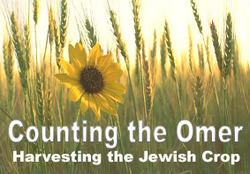Counting the Omer
" By virtue of the Omer that I counted today…may I be purified and sanctified with the sanctity from above, and may this cause an influence of great abundance in all the worlds."(Seder Sfirat HaOmer, terminating prayer).
At the conclusion of each night's counting of the Omer, we ask Hashem that we be purified and sanctified. We also say that our purification and sanctification triggers an influence of tremendous abundance in all the worlds – both material and spiritual.
Before attempting to comprehend the above principles, we have to realize that the people of Israel at Pesach are a nation of newly redeemed slaves. Not only were we newly redeemed slaves at the time of our exodus from Egypt, but every year at Pesach as well. Pesach is the furthest time of the year from the High Holidays of Rosh Hashanah and Yom Kippur, when all of Israel makes tshuva out of the awe of Hashem. As the long winter months transpire, we drop our guard and fall slaves to our bodily urges and appetites.
At Pesach time, we complete a process of physically cleaning our domains from chometz, or leavened agents, and begin a spiritual process of cleaning our hearts as a preparation for freedom. Tshuva is the cleansing of the heart from all evil.
True freedom, which includes the liberty from social pressure and bodily urges, comes only from Torah. Therefore, even though we break off the chains of bondage at Pesach, we're not really free until we receive the Torah 50 days later on Shavuot. During the interim 49 days, we count the Omer as a process of preparing ourselves to receive the Torah. Rebbe Nathan of Breslev says that each of the 49 days corrects a character attribute that corresponds to the 48 ways of attaining Torah (see tractate Avos, 6:6 for the entire list), while the 49th day serves as a correction to our prayers.
Rebbe Nathan writes (Abridged Likutei Moharan 63:2) that the 49 days of the Omer also correspond to the 49 gates of Tshuva. By reciting Tehillim (Psalms) every day, one can open each gate of Tshuva. Therefore, concludes Rebbe Nathan, saying Tehillim during each day of the Omer is extremely important.
Rebbe Nathan's principle of Tehillim and Tshuva explains how the purification of our souls during the days of the Omer invokes abundance in all the worlds, as we shall see – with Hashem's grace – in the following parable:
Yashka the farmer worked excruciatingly hard to prepare his field for corn planting in the spring. His hands were scarred and bloody from gripping the leather reigns that held his mighty ox in a straight line while plowing a furrow, and every muscle of his straining back would cry out in pain. When the field was finally prepared for sowing, he'd lovingly place each seed in the ground as if it were a cherished gem. When all was said and done, Yashka would pray for the blessing of rain that would trigger seed germination and subsequent growth.
While weeding the furrows, Yashka derived tremendous satisfaction from the stout young corn plants; the lush green stalks made all the hard work worthwhile. He looked forward to the expected bumper crop, but his joy was short-lived. Just as the fertilized corn flowers turned to baby seed cobs, the crows appeared. The minute Yashka saw the cawing black feathered menaces descend on his field, he ran out of his thatch-roofed house with a pitchfork in his hand, chasing away the crows.
No sooner would Yashka leave the field, and the crows would reappear. Disgusted, he erected a scarecrow in the middle of the field. The scarecrow repelled the crows for a day or two, but as soon as the clever birds realized that the straw-filled dummy with Yashka's old hat and shirt was both harmless and inanimate, they again descended on the crop.
This time, Yashka outsmarted them. His corn field was exposed to the prevailing breezes from all directions. Yashka carved a special flute out of a reed; then, he put the flute in the scarecrow's mouth. Every few minutes, the wind would blow; when it passed through the flute, it would create an amazing tooting sound in three different octaves that scared the crows away. By virtue of the flute, Yashka reaped a full crop of golden yellow corn.
Our Pesach preparations resemble Yashka's plowing and preparation of his corn field. The interim of the growth days between sowing and harvest correspond to the counting of the Omer. Just as Yashka's harvest was corn, the harvest of the Jewish people is Torah. The crows, symbolic of the Yetzer Hora and his accompanying temptations and bodily appetites, must be repelled in order for us to truly merit Torah on Shavuot. Often, we feel like we have no spiritual vitality, just like a scarecrow. But, by reciting Tehillim, we become spiritually vibrant and we scare away the Yetzer; the Tehillim – like a magical flute in a scarecrow's mouth - enable us to properly make tshuva and receive the Torah.
By virtue of Tehillim, we merit Tshuva, subsequently purifying and sanctifying ourselves. With Tshuva, we bring Torah into this world, together with all the accompanying material and spiritual abundance for all people everywhere. Also, when we receive the Torah, we become a truly free people, for there is no freedom without Torah (Avos 6:2). May this year be a year of freedom, abundance, and the true redemption of our people, amen.
Lazer Brody's Blog
- Lazer Brody's profile
- 7 followers




